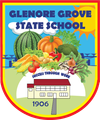Teaching and Learning

'Behind the Classroom Door'
Keep an eye out for our YouTube series called 'Behind the Classroom Door.' This semester we will be having a look at all of the amazing things that happen in our classrooms at Glenore Grove State School. Each week we will showcase a different class group. The link will be shared on Dojo and Facebook.
Term Overviews
We have some exciting learning to look forward to this term. Teachers will share term learning overviews & any housekeeping information with families via class dojo.
Homework Centre
We still have some spaces left on all 3 days- students are still welcome to join. We run Monday, Tuesday & Thursdays - 2:45 to 3:45 it includes staff to support homework activities like, reading, sight words & number facts as well as afternoon tea.
Complete registration and email to admin@glenoregrove.eq.edu.au
Premier's Reading Challenge
The Premier's Reading Challenge began on the 9th of May and goes through until the 26th of August. The Premier's Reading Challenge is not a competition but a way to encourage students to develop a love of reading for life. Through the challenge children are given an opportunity to develop their appreciation of the English language, and additional languages, and are encouraged to explore and enjoy a wide range of literary texts.
For a student to successfully complete the Premier's Reading Challenge they are required to read or experience the number of books indicated below:
- Prep to Year 2—read or experience 20 books.
- Years 3 to 4—read 20 books.
- Years 5 to 9—read 15 books.
Experiencing a book includes classroom or at home activities such as shared reading, listening and reading along with a book, or being read to. The requirement for Year 5 through to Year 9 students to read 15 books rather than 20 books acknowledges that older students are likely to select longer, more complex books that may take them longer to read. Students are encouraged to select a range of fiction and non-fiction books suited to their reading ability.
Student Support Services Term 3
NCCD at Glenore Grove
Traditionally, term 3 has been a very busy time for our Student Service Team, as we gear up to submit our data set to form part of the NCCD. This year, our data is more important than ever.
But what is the NCCD?
The Nationally Consistent Collection of Data on School Students with Disability (NCCD) gives Australian schools, parents, guardians and carers, education authorities and the community information about the number of students with disability in schools and the adjustments they receive. The Australian Education Regulation 2013 requires all schools to report the data collected for the NCCD to the Australian Government on an annual basis. This collection enables schools, like Glenore Grove, to better understand the needs of students with a disability and how to support them, in the best possible way.
Under the Disability Discrimination Act 1992 (DDA) and the Disability Standards for Education 2005 (the Standards), Australian students with disability (verified and imputed) must be able to access and participate in education on the same basis as their peers. To ensure this, students with disability may receive adjustments to access education, based on the professional judgement of teachers, in consultation with the student and/or their parents, guardians or carers. A verified disability is one where a medical diagnosis has been signed off by a medical specialist. An imputed disability is an undiagnosed disability the school team considers a student to have that is having a functional impact on their learning.
Why is the NCCD important for us? The NCCD is important as it helps us review our support systems; provides greater understanding about the needs of and supports for our students with a disability or imputed disability; it helps our teachers build capacity in making professional judgements; ensuring all support and adjustments are consistent for all students and finally, and most importantly, the collection will be our resource and support funding model. This funding model will be transitioned over the next 2 years. Our submission closing date this year, is the 5 August 2022.
Our role in Student Services is to ensure that all students have the support they need to be successful learners. Communication is a big part of this process. Parents and carers will be advised if their child is part of the collection,via email. Most of our parents and carers will be aware of the supports and adjustments their child is receiving, but if you would like to know more, please contact your class teacher to discuss this further.
If you would like to chat about any information you have read about the NCCD, please contact Hayley Freemantle.
The link to the NCCD portal is here.
Below is information on our new resourcing funding model.
Autism Queensland
A range of autism-related topics and designed for audiences including therapists, educators, teacher aides, school officers, lifestyle support workers, OHSC and vacation care staff, disability employment consultants, parents/carers/family members and others working with or supporting people on the spectrum.
Our workshops and webinars:
- Discuss evidence-informed practice: We use professional reasoning to bring together current high quality research evidence and the values, strengths and preferences of individuals and families.
- Are strengths focused: We strive to support the development of every person’s potential, recognising that a strengths focus enables growth and empowers decision making and self-advocacy.
- Use neurodiverse affirming language and approaches: Neurodiversity is part of human diversity and it doesn’t need fixing. Our workshops and webinars embrace, understand and celebrate all people and their right to belong and participate meaningfully.
- Provide a safe space: Everyone is welcome to attend and we provide and promote safe and respectful people and spaces to ensure you are comfortable within our workshop.
- Are co-designed with individuals with lived experience of autism.
Please click on link for access to these webinars.






